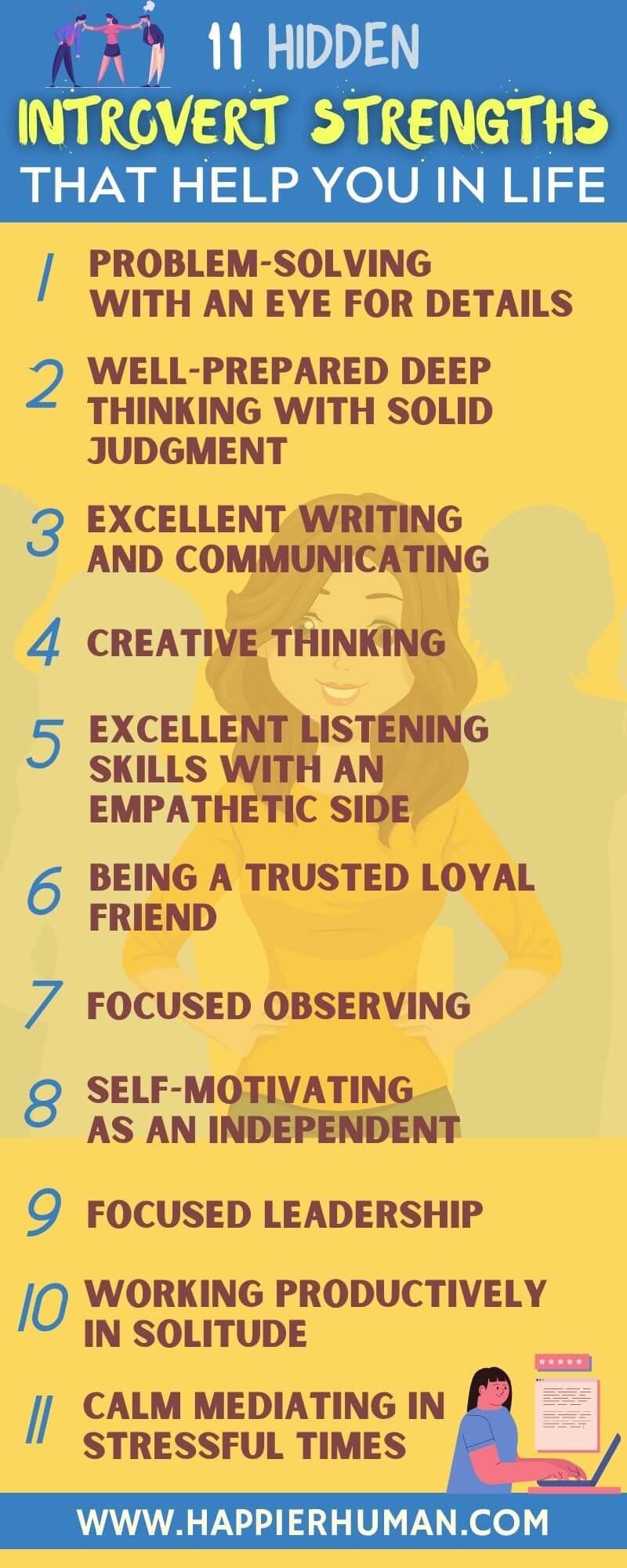There might be affiliate links on this page, which means we get a small commission of anything you buy. As an Amazon Associate we earn from qualifying purchases. Please do your own research before making any online purchase.
Once again, it’s happened. You’ve been accused of being too shy, being a recluse or anti-social… but that’s not how you really feel inside at all!
Whether you’re the introvert, or know someone who is, rest assured that an introvert is not an oddball. Nor are they emotionally flawed or socially inept. In fact, this article will demonstrate that introvert strengths are actually superpowers that other personality types can only dream of having.
(Side note: One of the best ways to increase your happiness and life satisfaction is to plan your day, so you focus on your TOP goals. To get started, watch this free video that details the 7-minute habit for planning your day to focus on what's important.)
What You Will Learn
- What is an Introvert?
- Introvert Traits
- Types of Introverts
- 11 Hidden Introvert Strengths That Help You in Life
- 1. Problem-Solving with an Eye for Details
- 2. Well-Prepared Deep Thinking with Solid Judgment
- 3. Excellent Writing and Communicating
- 4. Creative Thinking
- 5. Excellent Listening Skills with an Empathetic Side
- 6. Being a Trusted Loyal Friend
- 7. Focused Observing
- 8. Self-Motivating as an Independent
- 9. Focused Leadership
- 10. Working Productively in Solitude
- 11. Calm Mediating in Stressful Times
- Final Thoughts on Hidden Introvert Strengths
What is an Introvert?
First, an introvert isn’t necessarily shy, a people-hater, or full of social anxiety. Maybe you have a child, family member, or friend who has tried to explain this to others. It is true that an introvert might be shy, but so can anyone. There’s much more to the introvert personality than what others see on the surface. What you are about to discover may amaze you.
An introvert is a personality type that takes up real estate at the other end of the spectrum from an extrovert. This simply means that while an extrovert seeks out social interaction and thrives in a busy environment, the introvert does not. Instead, the introvert thrives in a quiet environment with less or no sensory overload. They enjoy spending time alone.
In defining what an introvert is, it is helpful to take a look at the personality traits. The following are just a few:
Introvert Traits
The definition of an introvert will also fluctuate, depending on the type.
Types of Introverts
These types of introverts may be blended to any varying degree or even overlap with extrovert tendencies. Since every person is unique, their personality and characteristics will also be. For now, this article will focus solely on the hidden strengths of introverted personalities.
Despite being constantly compared to extroverts, introverts reap a ton of benefits. Some include:
As an introvert, you may not know it yet, but you have some of the most powerful gifts of all humankind. This list of 11 hidden introvert strengths that help you in life is designed to aid you in self-reflection, meditation, and self-care. The objective is to illuminate your true immense value as an introvert, build your self-confidence, and help you live your best life.
11 Hidden Introvert Strengths That Help You in Life
1. Problem-Solving with an Eye for Details
Problem-solving and having an attention to details is an often-overlooked strength that few truly exert. An introvert’s brain is perfectly geared for this talent because the activity in the frontal cortex controls complex focus, thinking, and responses. Problem-solving with an eye for detail enhances creativity, risk management, and emotional intelligence.
This strength helps an introvert by contributing reliable information for carrying out everything from complicated career tasks to keeping them safe on the road and making good judgment calls on everything else. An introvert’s decision-making skills are bar none, and that shows in their organizational skills at home and at work, making them stand out from the crowd in excellence.
Check out ways to improve your problem-solving skills here.
2. Well-Prepared Deep Thinking with Solid Judgment
A different neurological process occurs in the introvert's brain than the extrovert, meaning that information takes a longer route through the brain of an introvert. This allows the person to take their time in deep thought, calculation, and preparation. An introvert thinks of every possible question that may arise, ready to respond with a decisive answer.
This power enables an introvert to foresee future scenarios, opportunities to redesign strategies, and seldom respond on impulse. A few jobs that may suit a deep thinker include:
Here are a few ways to enhance your cognitive thinking skills.
3. Excellent Writing and Communicating
Because introverts are deep-thinking problem-solvers, they are usually excellent written communicators. They are superb at organizing and putting their thoughts into writing. Since they have already thought out every possible question, comment, or response, their writing does not fail to address any of these. With more gray matter in the prefrontal cortex and an abundance of firing neurons, an introvert is well-equipped for abstract thought processes, reflection, and organization.
Writing increases cognitive thinking, and there are plenty of opportunities to hone your skills. These are a few careers that allow an introvert to employ these phenomenal writing skills and communication without a need for the spotlight:
Review this information about the connection between writing and critical thinking and how you can improve your skills.
4. Creative Thinking
The creative thinking of the introvert is exceptional because it is not harnessed by a need for attention or limelight. This leaves the introvert’s brain wide-open for free rein to explore all the possibilities. If you take the small talk and people interaction that an extrovert needs and wrap it up, you can counter it with an introvert’s ability to tie that energy up in a creative way.

The ingenuity of creatively thinking introverts rules nearly every career field or role in life. The ability to process information and organize thoughts is an exceptional gift, but the ability to create something unique, beautiful, valuable, functional, or all the above is downright brilliant. Here are a few ideas:
Here are some great ways to further develop your creative streak.
5. Excellent Listening Skills with an Empathetic Side
An introvert is a naturally great listener. They absorb the information, carefully mull it over, and provide a thoughtful, empathetic response. Active listening is a rare and precious skill in any situation, whether in personal life or work. It is so uncommon because few people know how to focus on what is being said without interjecting themselves or their opinions in the middle of the conversation.
An introvert understands the impact of the disruption of bad timing or changing the direction of the talk. A misstep may be misconstrued as injecting ego, being tone-deaf, or just not really listening at all. Jobs suited for an introvert with excellent listening skills might have to do with sales, working one-on-one with clients, conflict resolution, or human resources. Other career opportunities include coaching, counseling, or therapy work.
If you’re interested in honing your listening skills, check out these ideas.
6. Being a Trusted Loyal Friend
An introvert is an intensely loyal, attentive, and dependable friend who deliberately chooses a very small circle of close friends. They are excellent listeners and apply deep thought to the relationship, which results in great empathy. They take friendships seriously and only invest in those that they believe will be long-lasting bonds.
This superpower bleeds off into familial relationships as well. None of an introvert’s relationships are taken lightly. If you are a chosen one, you are lucky. It will be one of the most valuable friendships of your life.
While being a trusted, loyal friend seems to only apply to one’s personal life, there are career opportunities that value the introvert’s investment of trust and loyalty. Some may include the following:
Besides being a great listener, click here to learn how to become an even better trusted and loyal friend.
7. Focused Observing
An introvert absorbs their surroundings, observing the tiniest details and processing the information through critical thinking. While an extrovert is interacting and socializing loudly, the introvert is quietly sitting back and evaluating behaviors, reactions, and communications. This attribute gives the introvert greater information, knowledge, and power.
In a world where life seems to outpace time, finding someone with superior observation skills is becoming more and more difficult. Fast phones, fast internet, fast dating, fast education, and fast everything is the norm, which makes someone with these skills not obsolete but invaluable.
If you’re interested in careers for introverted observers, a few might be a mentor, consultant, researcher, scientist, analyst, proofreader, or editor. Keep in mind, an introvert who can also read body language, detect lies, or evaluate facial expressions is a rare find and highly valued in the business world.
Here is excellent information on how to improve your observation skills.
8. Self-Motivating as an Independent
Because introverts don’t need the spotlight and work diligently without distraction or supervision, they are incredibly productive when working alone. Typically, they already have the project timeline and outline mapped out. If a supervising voice does interfere, it only slows down the rapid progress of the introvert and is perceived as unnecessary small talk.
In their personal life and career, they must be allowed the time and space necessary to perform according to their individual strengths. Alone time in their personal life is life-giving, as an introvert desperately needs this time to recharge. A nice bonus is that an introvert doesn’t get upset when someone else in their life needs a little space too.
Here are some great jobs for a self-motivated, independent introvert:
For ideas on how to improve self-motivation, click on this link.
9. Focused Leadership
Because an introvert is a terrific listener, they also make a great leader and convey confidence to the whole team. Again, they don’t want the spotlight or attention, so their energy is freed up to concentrate on listening to others’ ideas, troubleshooting, strategizing, remaining calm, communicating clearly, and reassuring their team as needed. With the leader’s ego out of the way, everyone can participate, and the team can soar.
An introvert often leads in their personal life and their career. Their thoughtful insight, empathetic listening, and compassionate forethought make them a leader who is praised, appreciated, and admired by the entire team. The same usually follows with the introvert’s personal relationships. Several great leadership careers include:
To enhance your focused leadership skills, check out these ideas.
10. Working Productively in Solitude
A hardworking introvert who is productive in solitude frees up a manager’s time and resources to work with those who may not excel at working alone. An introvert carefully expends energy on doing deep thinking and organizing thoughts so that no time or effort is wasted about being productive. It comes naturally to an introvert and is not often a skill that can be taught.

Working productively in solitude is an invaluable asset to an employer and provides benefits on a personal level as well. There are several examples throughout history of this type of introvert. Albert Einstein performed his “thought experiments” in solitude. Also, Nikola Tesla did some of his most famous work in solitude.
Introverts are masters of productivity when working alone. Many of the suitable jobs for this type of work involve:
Ways to advance your productivity skills in solitude can be found here.
11. Calm Mediating in Stressful Times
Introverts are calm mediators who know how to step back, evaluate the situation, listen, and provide thoughtful assurance amid chaos. Because introverts are solidly grounded within themselves, the stability of their personality and approach is a beacon to others and comfort to those without it.
Some careers they may thrive in might be mediator, judge, lawyer, leader, supervisor, or other leadership roles where tense situations may call for a calming touch. Other opportunities may involve working with the stock market, estate planning, marriage counseling, family counseling, filmmaking, or the court system.
Here are some ideas to hone your calm mediating skills.
Introvert strengths are developed from within the womb. Science indicates that their introverted personality traits are fused into their brains and their beings. Introverts are not odd, weird, or less than any other human being. Instead, they are unique, gifted with special powers that we should appreciate and admire. Their hidden strengths make life a little bit easier and more beautiful, not just for them, but for all of us too.
Final Thoughts on Hidden Introvert Strengths
The hidden introvert strengths are not ordinary everyday powers. They are exceptional. They are exuberant. They are brilliant, and they breathe life. Without them, our world would be a pretty dull place. We are forever indebted to the hidden introvert strengths around the globe.
If you’re an introvert or know one that needs a boost, refer them to this article. When we lift one another in self-confidence, self-assurance, and love, we make our planet a kinder, gentler home for everyone.
Now, visit our site at Happier Human or take a glance at 45 Introvert Quotes to Survive in an Extroverted World. It is time for you to rise!

Rain Story is an author and screenwriter. She is an alumna of the University of Arkansas at Little Rock, the University of New Mexico, and the University of Kentucky. She earned two B.A.s and four years of graduate studies in literature, languages, and creative writing before personal tragedies pulled her away from her graduate work. She is also a Donaghey Scholar and fellow of the William G. Cooper, Jr. Honors Program in English.
Finally, if you want to increase your happiness and life satisfaction, then watch this free video that details the 7-minute habit for planning your day to focus on what's important.


